Just who paid for those t-shirts and bus rides?
Updated with corrected and additional information: Last week, Miami-Dade County commissioners, at the committee level, squashed the long-planned annexation of the Little Gables enclave into the City of Coral Gables, citing the lack of alternative low income housing for 225 residents who live in 90 trailers in a rundown lot that the city planned to red evelop into mixed use retail and workforce/rental housing.
evelop into mixed use retail and workforce/rental housing.
The Coral Gables code has no room for trailer parks.
County Commissioners Jose “Pepe” Diaz and Sally Heyman seemed aghast at the fact that not all of those people would be able to come back to new affordable digs. They acted like they haven’t been at least partially responsible as longtime commissioners for the gentrification of other areas and the skyrocketing prices of housing.
Ladra may have been wrong when, in an earlier draft, we posted that not all the Liberty Square residents will be able to return home. Despite several reports in reputable local publications that state the contrary, Jorge Cibron, the development division director for the Miami-Dade Department of Public Housing and Community Development insists that all the families who lived in the original Liberty City complex will be welcome back to the new, fancier Liberty Square Rising.
“The families that were in Liberty Square have a right to return,” he said, adding that family was defined as those “names on the lease.”
Which may mean that residents who were living with relatives but who were not on the lease — and we know there were some — will not be able to come back.
Still, there are an additional 800-plus units being built by Related Company and a number of those are reserved for families who make $16,000 a year or less. Another group of units will be for those who make up to $36,000 a year.
Perhaps Coral Gables could have worked something similar out. Both the city manager and the mayor have talked about housing for the service workers who work downtown and rental units for young couples and University of Miami graduates.
So this was a missed opportunity to create much-needed, additional affordable housing.
Because guess what? The trailer park is not public housing. The new owner, who has already received an offer of $8 million, can increase rents at any time to force the residents out. He has said he does not want to sell. Ladra says he’s holding out for more. The residents have no guarantee right now anyway. Why couldn’t there be some kind of condition that transitional housing be provided for current residents whose names are on the leases?
Heyman, who chairs the Health and Operations Committee, didn’t even give the city a chance to present their ideas. She treated City Manager Pete Iglesias with such disdain and disrespect you have to wonder if there’s something personal there from their past. Normally, city officials present before the public comments. She made Iglesias stop and sign a card.
A little historical perspective.
Several years ago, Miami-Dade identified small unincorporated municipal service area enclaves that 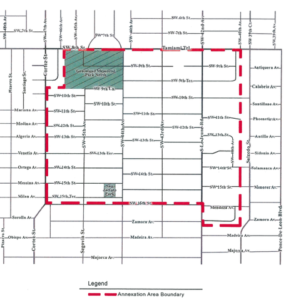 were not contiguous to other UMSA areas, making them harder and more costly to service. Everyone agreed these islands would eventually be better served being absorbed into a bordering city. For Little Gables, whose residents began the annexation process, that choice is Miami or Coral Gables. More than 60% of the homeowners of the area — roughly from 8th to 16th streets and from Salzedo to Cortez — said they wanted to be annexed into Coral Gables in not one, but two, surveys by Commissioner Rebeca Sosa‘s office. Last week’s commission vote would have simply put it on the ballot for all the Little Gables residents to vote on it. All residents, including the trailer park residents, would be able to vote on it.
were not contiguous to other UMSA areas, making them harder and more costly to service. Everyone agreed these islands would eventually be better served being absorbed into a bordering city. For Little Gables, whose residents began the annexation process, that choice is Miami or Coral Gables. More than 60% of the homeowners of the area — roughly from 8th to 16th streets and from Salzedo to Cortez — said they wanted to be annexed into Coral Gables in not one, but two, surveys by Commissioner Rebeca Sosa‘s office. Last week’s commission vote would have simply put it on the ballot for all the Little Gables residents to vote on it. All residents, including the trailer park residents, would be able to vote on it.
The committee also denied the city’s applications to annex High Pines and Ponce Davis, two areas in the south by Sunset Place that have also been on the annexation track for more than a decade. But most of the High Pines residents seemed adamantly against it. They want to paint their homes whatever color they want, keep their wood fences and park pick up trucks in their driveways (guess they didn’t get the memo about pick up trucks being allowed, for several years now, under certain conditions).
It was polar opposite for the non-trailer park residents of Little Gables, most of whom gave good reasons why they want to be annexed into the City Beautiful. The response from police and fire-rescue topped those. Not just the delay from county resources that are further away, but the fact that when Little Gables residents call 911, the first few crucial minutes are wasted trying to figure out who to send. Miami? Coral Gables? Miami-Dade?
But the chambers were filled with residents from the Gables Trailer Park, many of whom testified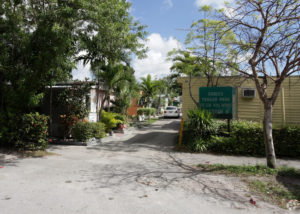 that they were on limited income. Their Legal Aid Services attorney cast them as a group of poor and elderly immigrants being abused by the big, bad, affluent city. But what she did not explain was that the 90 trailer spaces — the site of more than 70 code violations, including illegal add-ons, in 2016 — are simply leased to people 55 and over who let their grandsons and their grandsons’ baby mamas live there, too. That’s how they get to 225.
that they were on limited income. Their Legal Aid Services attorney cast them as a group of poor and elderly immigrants being abused by the big, bad, affluent city. But what she did not explain was that the 90 trailer spaces — the site of more than 70 code violations, including illegal add-ons, in 2016 — are simply leased to people 55 and over who let their grandsons and their grandsons’ baby mamas live there, too. That’s how they get to 225.
Also, they didn’t look like they got to County Hall all on their own. Some were seen getting off a chartered bus. And dozens of them wore matching red and white t-shirts that expressed their desire not to be annexed.
Who paid for all that? Seemed like an organized campaign by some hidden interest. It was obvious. So why didn’t any commissioner say anything?
Read related: Secretly funded PAC attacks Ralph Cabrera with mystery mailers, lies
Could it be the same forces that paid for the malicious attack mailers that  put Gables Commissioner Jorge Fors in office? We still don’t know who financed at least five mailers sent out before the April elections that were credited to a political action committee that has denied involvement and has reported no financial activity since at least last October.
put Gables Commissioner Jorge Fors in office? We still don’t know who financed at least five mailers sent out before the April elections that were credited to a political action committee that has denied involvement and has reported no financial activity since at least last October.
Fors, who made anti annexation a campaign issue, hasn’t bothered to find out who his benefactor is, but las malas lenguas say it is the Miami Executive Hotel on Eighth Street in Little Gables, just a stone’s throw from the trailer park, which would no longer be allowed to rent rooms by the hour, a service that caters to prostitution as well as teenage trysts.
And among the interests there to oppose the annexation were, lo and behold, 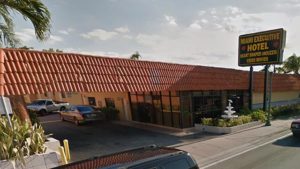 both the brand new commissioner and a lawyer representing Resorts of Dade, the owners of the hotel with steamy theme rooms that cater to sexual fantasies. Attorney Robert Fernandez told the committee there are about 45 rooms at the hotel. “We employ good, hard working people. We pay our taxes.”
both the brand new commissioner and a lawyer representing Resorts of Dade, the owners of the hotel with steamy theme rooms that cater to sexual fantasies. Attorney Robert Fernandez told the committee there are about 45 rooms at the hotel. “We employ good, hard working people. We pay our taxes.”
Ever concerned with affordable housing, Heyman had to ask: “I’ll assume it’s affordable when it comes to short term?”
There was audible laughter in the room. Does Heyman know how short and how affordable? How’s $28 for two hours, commissioner? Or $33 for three hours ($55 for a room with a jacuzzi)? Ladra thinks even Fernandez blushed.
Fors said he was there to speak on behalf of the Gables residents who had elected him, the majority of whom are against the annexation, he said, and we only have his not-so-solid word to go on. What he really did was sandbag City Manager Peter Iglesias, who seemed tongue-tied after one of his bosses went up to the podium and basically said the residents of Coral Gables didn’t 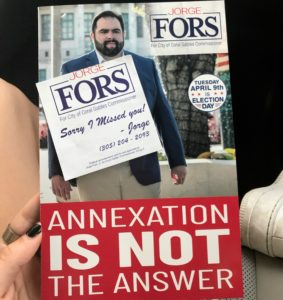 want the annexation to move forward.
want the annexation to move forward.
“I’m not here to argue for or against annexation. I’m just here to share my experience from the recent election,” Fors said, adding that he talked to thousands of people. “It was my impression that the majority of Coral Gables residents were against annexation.
“In good conscience, I could not have had all those conversations then not show up to advise you today,” he said, as if he didn’t win by smearing his opponent with lies and creating a wedge issue on annexation.
Read related: Coral Gables candidate Jorge Fors stirs annexation fears for votes
Mayor Raul Valdes-Fauli and others — who have been working on this  annexation for years, with dozens of meetings on it — were not happy about Jorgy-Come-Lately’s interference. In an email to his colleagues and city administrators, Valdes-Fauli wrote “The Executive Motel prevailed and ‘we’ helped them do so. What a pity!!”
annexation for years, with dozens of meetings on it — were not happy about Jorgy-Come-Lately’s interference. In an email to his colleagues and city administrators, Valdes-Fauli wrote “The Executive Motel prevailed and ‘we’ helped them do so. What a pity!!”
His quotes on “we,” not mine.
Valdes-Fauli did not return several calls to his cell phone. The arrogant brat is still pissed at Ladra for supporting Jeannett Slesnick, twice. But at least two residents have asked to speak during public comments about this at the July 27th meeting and Ladra expects Valdes-Fauli to say something.
Iglesias told Ladra that, based on the testimony of residents and Commissioner Xavier Suarez‘s suggestion, the city may move forward again on another attempt at annexing Ponce Davis, which seemed more favorable to the move. He will meet with commissioners at a sunshine meeting Aug. 5 to discuss their options for all three areas.
Naturally, we expect Fors to urge his colleagues to drop the Little Gables application. But Ladra has a better idea.
Don’t just take his word for it that thousands of Gables residents are against the annexation. The city should do its own survey, explaining the pros and cons, to the residents who will most be affected — both positively or negatively — which are in North Gables.
Read related: Coral Gables candidate Jorge Fors has it all wrong on annexation
But first, let the neighbors tell them how many times the U.S. Drug Enforcement Agency has raided the trailer park. Let Gables Police Chief Ed Hudak tell them how he 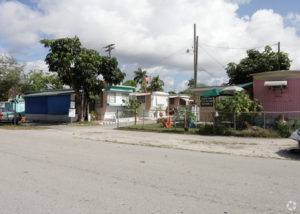 supports annexation because of the “hole in the donut” that they cannot actively patrol. And tell them that the owner of the trailer park could also shut it down and redevelop it — with county zoning rules — any time he wants.
supports annexation because of the “hole in the donut” that they cannot actively patrol. And tell them that the owner of the trailer park could also shut it down and redevelop it — with county zoning rules — any time he wants.
Iglesias told the county commission that the city would try to transition some people to the most affordable housing in the new project, but Heyman knew it would never be at the dirt cheap prices (from $500 a month!) they pay now.
The city manager reminded her that they pay those rents for what really amounts to sub standard living conditions in homes they have to evacuate for hurricanes.
“We need to find a better way to house people than disposable construction like that,” he said.
Quipped Heyman: “It’s a hell of a lot safer for them to be in a trailer than homeless on the street!”
Until someone dies in a fire.

